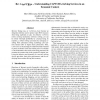Free Online Productivity Tools
i2Speak
i2Symbol
i2OCR
iTex2Img
iWeb2Print
iWeb2Shot
i2Type
iPdf2Split
iPdf2Merge
i2Bopomofo
i2Arabic
i2Style
i2Image
i2PDF
iLatex2Rtf
Sci2ools
110
click to vote
USS
2010
2010
Re: CAPTCHAs-Understanding CAPTCHA-Solving Services in an Economic Context
Reverse Turing tests, or CAPTCHAs, have become an ubiquitous defense used to protect open Web resources from being exploited at scale. An effective CAPTCHA resists existing mechanistic software solving, yet can be solved with high probability by a human being. In response, a robust solving ecosystem has emerged, reselling both automated solving technology and realtime human labor to bypass these protections. Thus, CAPTCHAs can increasingly be understood and evaluated in purely economic terms; the market price of a solution vs the monetizable value of the asset being protected. We examine the market-side of this question in depth, analyzing the behavior and dynamics of CAPTCHA-solving service providers, their price performance, and the underlying labor markets driving this economy.
| Added | 15 Feb 2011 |
| Updated | 15 Feb 2011 |
| Type | Journal |
| Year | 2010 |
| Where | USS |
| Authors | Marti Motoyama, Kirill Levchenko, Chris Kanich, Damon McCoy, Geoffrey M. Voelker, Stefan Savage |
Comments (0)

